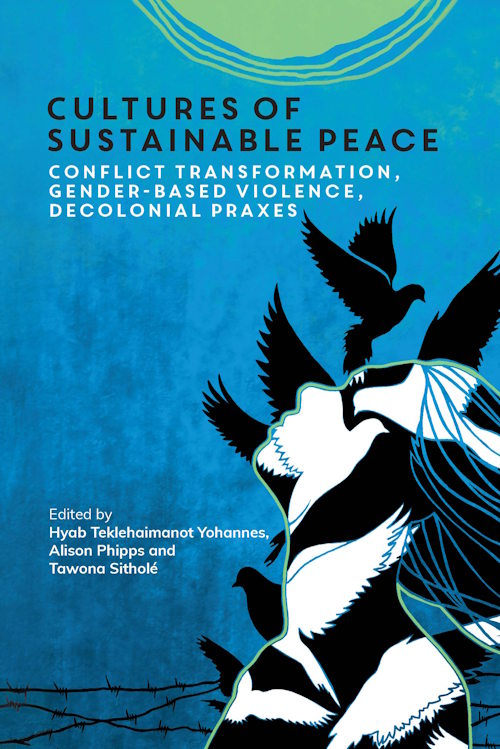12 December 2024
Wednesday was Human Rights Day, and it was also the publication day of Cultures of Sustainable Peace: Conflict Transformation, Gender-Based Violence, Decolonial Praxes, edited by Hyab Yohannes, Alison Phipps and Tawona Sitholé, which is an output from the AHRC/GCRF-funded CUSP Network Plus. Today's advent treat is the editors' blog about the book originally published on the Multilingual Matters website.
Sustainable Peacebuilding: The Work of Ordinary People

Following two devastating world wars, the cry of ‘never again’ resonated across the world, leading to the creation of the United Nations and its many agencies, including UNESCO, all aimed at safeguarding human dignity and upholding international peace. Over time, various treaties and conventions, such as the Geneva Conventions and the Universal Declaration of Human Rights, have strengthened this framework, striving to regulate the conduct of war and protect individuals and communities from violence. Yet, peace remains elusive in many parts of the world, where war and violence have increasingly become the precarious norm, determining who survives and who faces brutality with impunity for the perpetrators.
This book shifts the focus of peacebuilding from nation-states and international organisations to the ordinary people who are the founders and foundations of lasting peace. From childhoods spent in the shadows of shantytowns in Zimbabwe to forced marriages in Ghana, femicide in Mexico, gender-based violence in Morocco, and the ongoing genocide in Gaza, one common thread runs through these experiences: an irreducible desire to be free and live in a culture of sustainable peace. This book is born out of that unyielding longing for freedom and the pervasive violence that has devastated lives, livelihoods, and relationships. However, it does not dwell on this precarious reality. Instead, it explores ways to transcend that reality through creative and imaginative practices of peace, multilinguality, and mutuality. Despite the geographical and temporal distances, these stories envision the creation of human communities based on cultures of peace, resisting war, destruction, and gendered violence. The collective voice of our partners and contributors underscores the importance of documenting peace in times of genocide, femicide, and ‘scholasticide’ – themes that inspired the book’s title. The book’s distinct purpose is to envision peace and clear pathways toward decolonial possibilities.
Like the people whose stories we share, the book itself (and the words within it) has survived war, famine, natural disasters, drug cartels, religious oppression, femicide, and ongoing genocide. Some contributors did not survive, and their work is recognised posthumously. The book also survived the UKRI GCRF funding cuts, which sought to make this work impossible.
We acknowledge that the survival of this work was made possible by the colleagues who ensured it came to fruition. The lead editors would have been redundant, and the contributors to this volume would have lost their livelihoods overnight due to the cuts, had the University of Glasgow not stepped into the breach and campaigners ensured the restitution of funds.
Many authors in this book, despite facing persecution for accepting and then losing ODA money, have contributed invaluable insights. We are deeply grateful to the colleagues, including the reviewers, administrators, publishers, project leads, participants, and contributors, who make this work possible, often from behind the scenes, and are rarely given the recognition they deserve.
We also thank the copyeditors, whose understanding of our plea helped ensure that ‘Error 404’ did not erase the precious words in this book. For those unfamiliar with the term, Error 404 is a message that appears when a requested webpage cannot be found, often because the page has been deleted, removed, or blocked. This error frequently appeared in references to reports, briefs, and newsletters published online by universities, local authorities, and organisations in Gaza, which our contributors had cited in their chapters. As editors and contributors, we were baffled: Where have these stories gone? They seem to have vanished from the online world, a phenomenon akin to epistemicide or the erasure of knowledge and the means of knowing.
Thanks to the understanding and generosity of our copyeditors and publishers, these words now exist in the pages of this book, as well as in the memories of those authors who are still alive. When words disappear from online sources, our colleagues and contributors become the bearers of these words. They are the ones who can attest to their existence, and their intellect and memories have become the remaining archives. We trust in their knowledge and recollections. We refuse to be complicit in the erasure of these words. We cherish them as the last traces of what once existed but has now disappeared.
You will find these words in the book – words like hope, justice, education, peace, culture, and more. In these dark times, these words may seem fleeting, but we believe they must never be abandoned or allowed to disappear. Even in the darkest of times, we shall continue to utter them as our last words and practise them as precious foundations for human relations.
The book is dedicated to our colleague Refaat Al Areer, who was assassinated by the Israeli forces for his attempts to use his scholarship to make a sustainable peace. His work informed this book.
For more information about this book please see the Multilingual Matters website. The book is available open access here.
If you found this interesting, you might also like Meeting the Needs of Reunited Refugee Families by Sarah Cox.

